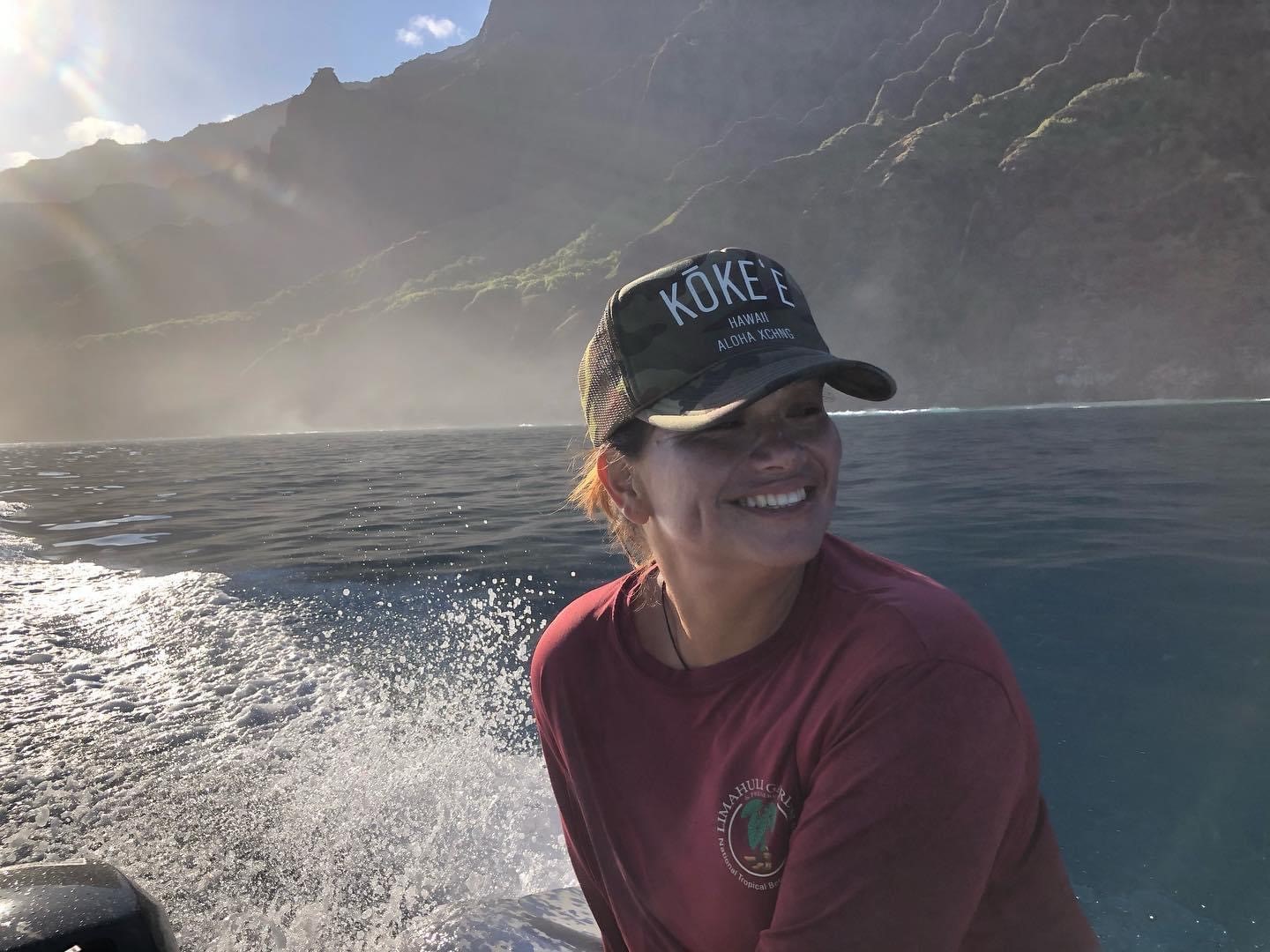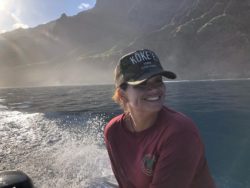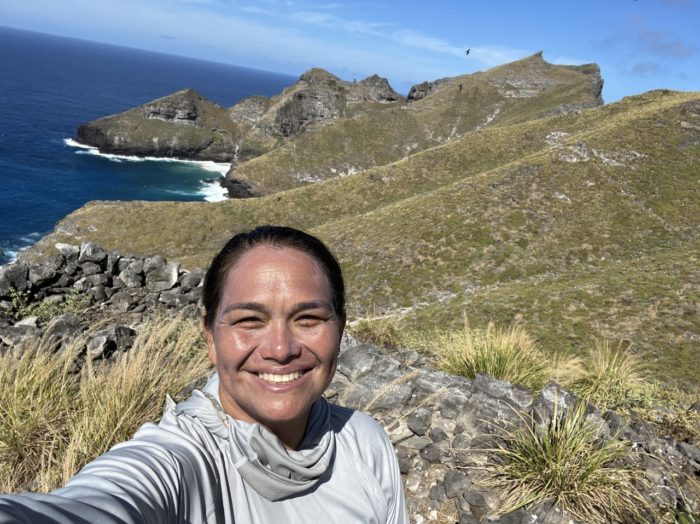
CHOW Chat: Pelika Andrade on Native Hawaiian Heritage and Indigenous Values and Vision
 The Capitol Hill Ocean Week 2022 program will recognize the 50 years of progress achieved in ocean and coastal conservation and set a course for the new policies and actions necessary to sustain our waters and transform our future. Pelika Andrade is a Native Hawaiian born and raised on the island of Kauaʻi. She is is a member of the 2022 CHOW Advisory Committee, Founder and Executive Director of Na Maka Onaona, a Hawaii based non-profit, and an extension agent for the University of Hawaii Sea Grant College Program. She has a long history working with Hawaii communities throughout the archipelago as a community member, hoaʻāina, and researcher. For the past 14 years, she has been developing alternate approaches to monitoring Hawaiʻi’s watersheds and supporting implementation of management strategies that support ‘Āina Momona: healthy, balanced and thriving communities. We spoke with Pelika about her role on the Advisory Committee, her hopes for this year’s conference, and her vision for the next 50 years of ocean and coastal conservation. Register today at CapitolHillOceanWeek.org!
The Capitol Hill Ocean Week 2022 program will recognize the 50 years of progress achieved in ocean and coastal conservation and set a course for the new policies and actions necessary to sustain our waters and transform our future. Pelika Andrade is a Native Hawaiian born and raised on the island of Kauaʻi. She is is a member of the 2022 CHOW Advisory Committee, Founder and Executive Director of Na Maka Onaona, a Hawaii based non-profit, and an extension agent for the University of Hawaii Sea Grant College Program. She has a long history working with Hawaii communities throughout the archipelago as a community member, hoaʻāina, and researcher. For the past 14 years, she has been developing alternate approaches to monitoring Hawaiʻi’s watersheds and supporting implementation of management strategies that support ‘Āina Momona: healthy, balanced and thriving communities. We spoke with Pelika about her role on the Advisory Committee, her hopes for this year’s conference, and her vision for the next 50 years of ocean and coastal conservation. Register today at CapitolHillOceanWeek.org!
What are you most looking forward to during Capitol Hill Ocean Week 2022? Potential collaborations and/or initiatives that are addressing ocean health as well as community health.
How have you hoped to shape this year’s Capitol Hill Ocean Week through your role on the Advisory Committee? I hope I am able to bring some great representation of Hawaii and the Pacific Islands to the conversation…with a focus on Indigenous knowledge, perspectives, contributions, and responsibilities.
How does your experience as a Native Hawaiian shape your perspective on the importance of preserving special places in our ocean for future generations? Preservation is the wrong term. I am not interested in preserving special places. I am interested in optimizing production and supporting productivity. That is the biggest contribution I feel that Indigenous perspectives and relationships have to our contemporary initiatives.
How can we best ensure that the voices of local communities are being heard in decision-making processes and meaningfully engage with them when developing management strategies for our ocean and coasts? There are many ways, but one that has continued to come up recently is the need for decision-makers and policy makers to get out of the office and meetings… get into the community… and get to know the users who their decisions are affecting. A lot of us get pulled into meetings and these top-level discussions because of our expertise and experience. But over time, we spend so much time in these meetings and discussions, we quickly disconnect from either the source of our investment or the communities we represent.
Another way to ensure local communities are heard is changing how we ask questions. Simply asking what they want is not sufficient enough. Most people, when asked what they want, will answer according to what they think the asker knows or can connect to. For example, if a farmer asks a family what they want, the family may respond by asking for lettuce or tomatoes. Same question when asked by a fisherman, the family may ask for fish. When scientists or marine managers ask the community what they want, they respond by answering according to those specialties and what they know about that subject… but a lot of what communities know about that subject are sourced from the very scientist and managers through media, news, current marine initiatives, etc., so the root of it isn’t exactly locally sourced needs. Asking communities what end goals and outcomes would they like to see for oceans and marine resources is really getting to the root of it all. Also when asking these broader goal/outcome questions, keep asking and digging into the meat of it all. Why? ok and why? ok and why? You will get a very different answer. Here in Hawaii when I ask the community what they hope to achieve … They want to maintain and strengthen traditional relationships to these places. They want this maintenance and strengthening to continue generationally. They want generational access to these places. They want generational harvesting to these places. They want continued daily/weekly/monthly engagements with these places. They want these places to thrive. All those outcomes are not found in contemporary MPAs. Some of these MPAs actually prohibit some of these outcomes. But when you ask communities what they want, especially as a manager, they will answer to what they think you know or are asking so they will ask for protections within the tool kit that you, the manager, are bringing to the table. If we go back and take their outcome/goal answers seriously…we probably could problem solve towards an “MPA” that could address all of those requests and get habitat health, population size and distribution, etc. all covered… because in order to provide generational everything, we’d need to ensure all the health of the drivers for productive fisheries.
And one last recommendation is to change how we engage with local communities. We need to start engaging how they engage and not how we engage. Meetings (especially during work hours) and polls, etc… Start participating in community events. Get to know your community and participate in the community. Gain trust and earn the privilege of contribution…then a whole new world will open up to you and then you got meaningful.
What are some ocean and coastal conservation policies you would like to see enacted to support healthy, balanced, and thriving communities? Policies that address other impacts other than fishing. We know recreation and tourism has huge impacts on fisheries. Also, local-based allowances. I understand constitutional rights but we do need to find ways to provide support of those who are invested and carrying responsibilities in communities. Right now, EVERYONE is given equal access but not everyone is carrying equal responsibility and/or investment. Our laws need to find a way to honor investment, local privileges taking precedence over visitor privileges, etc.
The theme of this year’s conference is Sea: The Future. What do you envision for the next 50 years of ocean and coastal conservation? What do you hope the ocean conservation community will be able to accomplish? I hope to see more Indigenous values and vision be brought into the conversation as important drivers in goals/outcomes to ocean/coastal conservation. I also hope we are able to support growing and deepening our people relationships to place, stressing the lens of reciprocity and balance.

Pelika visiting Nihoa, Papahānaumokuākea. Photo credit: Pelika Andrade
